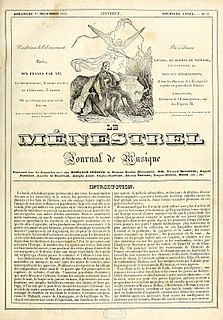 W
WThe Oxford Companion to Music defines music criticism as "the intellectual activity of formulating judgments on the value and degree of excellence of individual works of music, or whole groups or genres". In this sense, it is a branch of musical aesthetics. With the concurrent expansion of interest in music and information media over the past century, the term has come to acquire the conventional meaning of journalistic reporting on musical performances.
 W
WThe Allgemeine musikalische Zeitung was a German-language periodical published in the 19th century. Comini (2008) has called it "the foremost German-language musical periodical of its time". It reviewed musical events taking place in many countries, focusing on the German-speaking nations, but also covering France, Italy, Russia, Britain, and even occasionally America.
 W
WLes Annales du Théâtre et de la Musique was an annual French periodical which covered French dramatic and lyric theatre for 42 years, from 1875 to 1916. The volumes also covered concert series and necrology. It was co-edited by Édouard Noël (1848–1926) and Edmond Stoullig (1845–1918) and was published in Paris by Charpentier from 1876 to 1895 and Berger-Levrault in 1896. Beginning in 1897 it was published annually by Paul Ollendorff up to 1914 with the penultimate volume published in 1916 and the final volume in 1918. A total of 41 volumes were published.
 W
WThe Forensic Records Society is a novel by English author Magnus Mills published in 2017 by Bloomsbury.
 W
WIl teatro alla moda is a satirical pamphlet in which its author, the Venetian composer Benedetto Marcello (1686–1739), vents his critical opinions on the milieu of the Italian opera seria in the first decades of the eighteenth century. It was first published anonymously in Venice, by the end of 1720. Virtually every aspect of opera seria and its social environment is mercilessly criticized by Marcello: the artificiality of plots, the stereotyped format of music, the extravagant scenography and machinery, the inability and venality of composers and poets, the vanity and vulgarity of singers, the avidity of impresarios, the ineptitude of musicians.
 W
WThe International Film Music Critics Association (IFMCA) is a professional association for online, print and radio journalists who specialize in writing about original film and television music.
 W
WLe Ménestrel was an influential French music journal published weekly from 1833 until 1940. It was founded by Joseph-Hippolyte l'Henry and originally printed by Poussièlgue. In 1840 it was acquired by the music publishers Heugel and remained with the company until the journal's demise at the beginning of World War II. With the closure of its chief rival, La Revue et gazette musicale de Paris in 1880, Le Ménestrel became France's most prestigious and longest-running music journal.
 W
WNeue Berliner Musikzeitung was a musical periodical that appeared in the years 1847–1896 and was published by Bote & Bock. It was a continuation of the Berlin musical newspaper published between 1844–1847 by Karl Gaillard.
 W
WNightshift is a free monthly music magazine in Oxford, England. Distributed via music venues, pubs, and shops, it provides music news, gig listings, and reviews for the city and surrounding area.
 W
WThe Revue musicale was a weekly musical review founded in 1827 by the Belgian musicologist, teacher and composer François-Joseph Fétis, then working as professor of counterpoint and fugue at the Conservatoire de Paris. It was the first French-language journal dedicated entirely to classical music. In November 1835 it merged with Maurice Schlesinger's Gazette musicale de Paris to form Revue et gazette musicale de Paris, first published on 1 November 1835. It ceased publication in 1880.
 W
WLa Revue musicale was a music magazine founded by Henry Prunières in 1920. La Revue musicale of Prunières was undoubtedly the first music publishing magazine giving as much attention to the quality of editing, iconography, and illustration. In each issue, there was plenty of information on the musical and choreographic life in many countries.
 W
WRockism is the belief that rock music is dependent on values such as authenticity and artfulness, and that such values elevate the genre over other forms of popular music. So-called "rockists" may promote the artifices stereotyped in rock music or may regard the genre as the normative state of popular music. Poptimism is the belief that pop music is as worthy of professional critique and interest as rock music. Detractors of poptimism describe it as a counterpart of rockism that unfairly privileges the most famous or best-selling pop, hip hop, and R&B acts.
 W
WThe critical reputation of the British composer Arthur Sullivan has fluctuated markedly in the 150 years since he came to prominence. At first, critics regarded him as a potentially great composer of serious masterpieces, the long-awaited great English composer. When Sullivan made a series of popular successes in comic operas with the librettist W.S. Gilbert, Victorian critics generally praised the operettas but reproached Sullivan for not concentrating on composing solemn choral works and grand opera instead. Immediately after Sullivan's death, his reputation was attacked by critics who condemned him for not taking part in what they conceived of as an "English musical renaissance". By the latter part of the 20th century, Sullivan's music was being critically reassessed, beginning with the first book devoted to a study of his music, The Music of Arthur Sullivan by Gervase Hughes (1960).